Théodore Dubois: Chamber Music
The music of Théodore Dubois (1837–1924) has rather been overshadowed by that of other French composers of the same period, not least Fauré and Saint-Saëns. But Dubois does not deserve his relative neglect: not only was he a superlative craftsman, but he could also unfold a fetching melody and had a strong sense of musical narrative. This recital of chamber works for oboe and strings is noteworthy for a further quality, one often underestimated: much of the music is, quite simply, charming.
Lajos Lencsés, oboe (Tracks 1 – 5, 10, 13, 14)
Gustavo Surgik, violin (Track 5)
Leo Lencsés, cello (Track 13, 14)
Carole Dubois, piano (Track 1 – 4)
Antal Váradi, organ (Tracks 5, 10)
Renie Yamahata, harp (Track 10)
Quatuor Parisii
Arnaud Vallin, violin (Tracks 1 – 4, 6-9, 11-12)
Doriane Gable, violin (Tracks 6-9, 11-12)
Dominique Lobet, viola (Tracks 1-4, 6-9, 11-12)
Jean-Philippe Martignoni, cello (Tracks 1-4, 6-9, 11-12)
Budapest Strings (Tracks 10, 13, 14)
Listen To This Recording:
-
Quintet in F major for violin, oboe, viola, cello and piano (1905)
- I Allegro
- II Canzonetta
- III Adagio non troppo
- IV Allegro con fuoco
- Méditation
- I Larghetto – Allegro – Larghetto
- II Allegro animato e molto leggiero
- III Larghetto
- IV Allegro vivo – Larghetto – Allegro Vivo
- Méditation-Prière, Op. 17
- I Andantino
- II Andantino grazioso
- No. 1 Adagio, molto espressivo
- No. 2 Allegretto grazioso
Méditation for violin, oboe and organ (1900)
String Quartet No. 1 in E flat major (1909)*
Méditation-Prière, Op.17, for oboe, strings, harp and organ (publ. 1869)**
Petits rêves d’enfants for string quartet (1903)*
Deux pièces en forme canonique for oboe, cello and strings (1901)
*FIRST RECORDINGS
**FIRST RECORDING IN THIS VERSION
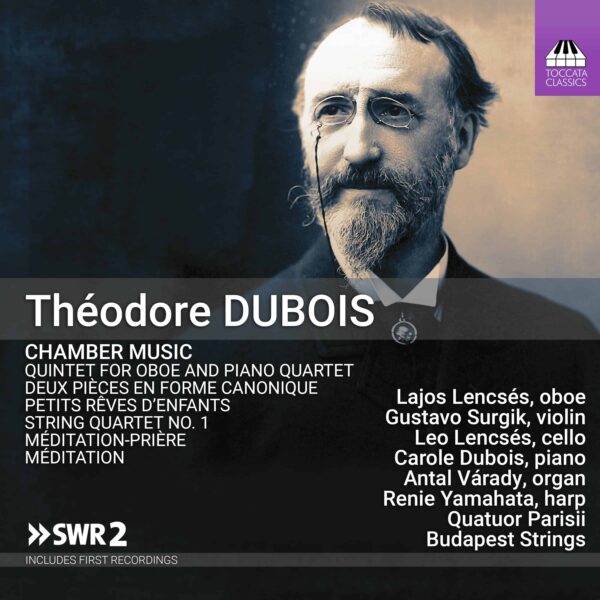
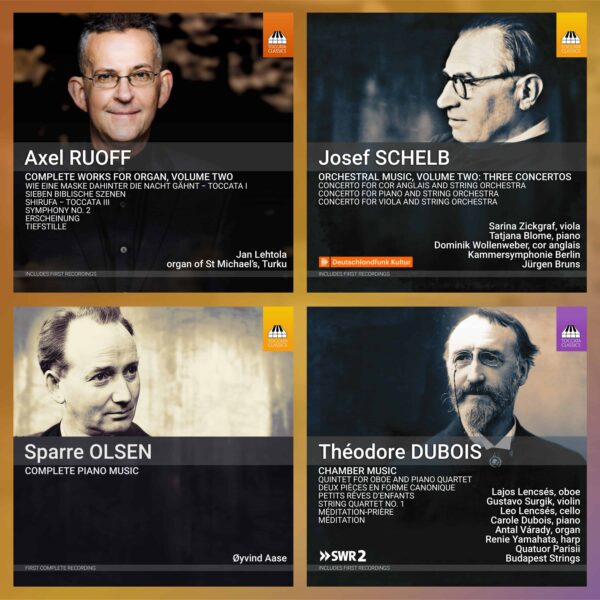
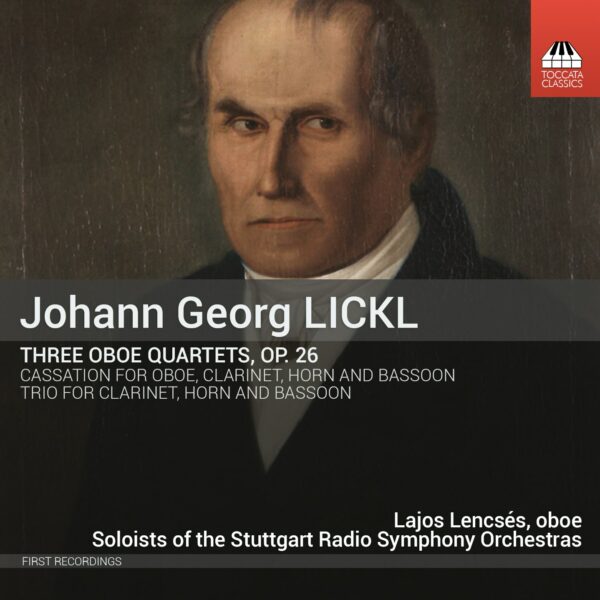
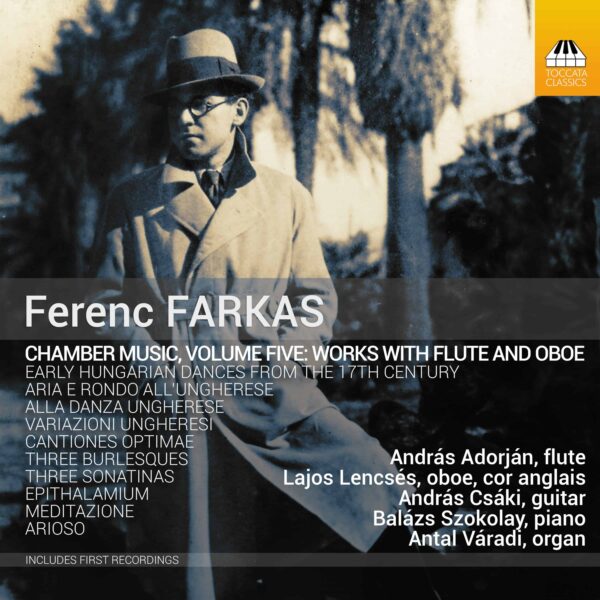
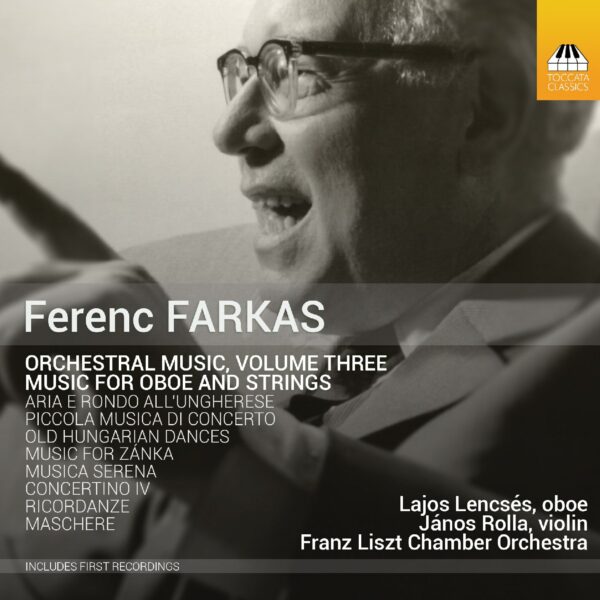
MusicWeb International :
‘Oboist Lajos Lencsés’s praiseworthy playing has notable facility in the four works for his instrument, even if in 2020 he was in his late seventies. The Budapest Strings play the Méditation-Prière and Deux pièces with integrity and fine ensemble work. Quatuor Parisii, founded by Conservatoire de Paris students in 1981, gives adept and pleasing contributions.’
—Michael Cookson, MusicWeb International
MusicWeb International :
‘Pity poor Theodore Dubois. He so much wanted to be remembered for one thing, but ended up being remembered for another. And now, with this utterly delightful CD, we learn that his real genius lay somewhere else altogether. […]
TV producers on the lookout for the perfect off-the-shelf theme music for one of those Sunday evening period-dramas will find everything they could possibly ask for in the opening bars of Dubois’s Quintet. Here, a deliciously logical and self-contained oboe theme encapsulates that sense of manicured beauty found in the gardens of stately homes in full, summer bloom with just the faintest whiff of nostalgia and the promise of passionate encounters to come. It’s a deliciously coherent and perfectly formed movement which builds on that opening theme in a totally satisfying way, giving all five instruments plenty of time to bask in the afternoon sunshine. The second movement is similarly logical, coherent, and utterly satisfying, but here we have more than a hint of the disarming melodic insouciance of Faure; the ending, I should add, is truly endearing. A warm viola solo singing out a solemn, hymn-like theme, with a hint of Elgar, opens the graceful third movement, the music of which finds me recalling that verse from Tennyson’s Maud, (“I kiss’d her slender hand/She took the kiss sedately;/Maud is not seventeen, /But she is tall and stately.”). The finale is a tautly constructed, firmly-restrained display of gymnastic energy, full of unequivocal gestures and neatly-tailored touches, and it epitomises the character of Dubois’s music – elegant, controlled, logical and utterly satisfying. […]
[The first quartet is] played, however, with wonderful energy and elan by Quatuor Parisii. […] The first String Quartet was not Dubois’ first venture into the realm of string quartet writing. In 1903 he had composed two short, sweet and endearing Reves d’enfants for string quartet. Full praise, again, to the Parisii Quartet for delivering this delicate and simple music with such deep affection. […]
Written for another famous Paris concert series – the Concerts Colonne – the Deux pieces en forme canonique is a duet for oboe and cello supported by a string ensemble. Father and son Lajos and Leo Lencses are the soloists here, supported by the Budapest Strings, and highly eloquent and sensitive they all are in a performance of two neat and elegant pieces which nicely combine a certain academic confidence with hints of more intimate emotions. It provides a most fitting conclusion to a disc of delightful charms.’
—Marc Rochester, MusicWeb International
WTJU :
‘This release features several chamber works by Dubois. They show a composer with a gift for melody and a talent for organizing his material. […]
The assembled musicians deliver nuanced, committed performances. They help make the case that this music needs to be heard.
If you enjoy the music of French masters such as Massenet and Saint-Saens, give Dubois a listen. It’s music worth exploring.’
—Ralph Graves, WTJU